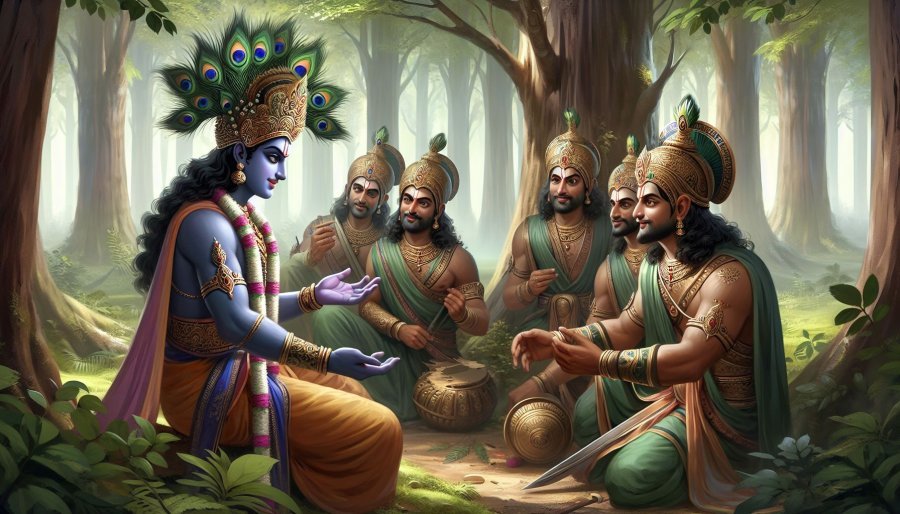Section LI - Dhritarashtra's anxiety about the Pandavas' invincibility
Book index: Mahabharata (English)
This page contains a summary of the Mahabharata Section LI including examples of moral lessons in daily life. The Maha-Bharata is one of the largest epics ever written containing roughly 100,000 Sanskrit verses. It deals with the legendary history of ancient India and contains a large number of interwoven tales.

Short summary of the chapter:
Dhritarashtra, upon hearing of the wonderful way of life of the sons of Pandu, becomes filled with anxiety and grief. Recognizing the exceptional heroism and prowess of the Pandavas, he laments the misbehavior of his own sons, particularly their past gambling and treatment of Draupadi. Dhritarashtra predicts that in the upcoming battle, the Pandavas led by Krishna and Arjuna will easily overpower his army, including the mighty warriors on his side.
Sanjaya informs Dhritarashtra that his failure to prevent his son Duryodhana's actions was a great fault. Lord Krishna, upon meeting the Pandavas in the woods of Kamyaka, expresses his determination to restore their lost prosperity and defeat their enemies. Yudhishthira agrees to Krishna's plan to launch an attack after thirteen years, and the counsellors pacify Krishna and assure Draupadi of vengeance on her offenders.
Krishna, along with the Pandavas and their allies, prepares for the predicted battle against Duryodhana and his followers. Promising to slay their enemies, Krishna and the Pandavas vow to restore Yudhishthira to his rightful place as ruler. The warriors, including Rama, Bhima, Arjuna, and others, are described as invincible and ready to face their foes. The stage is set for a final confrontation between the forces of good led by the Pandavas and Krishna and the forces of evil led by Duryodhana.
Dhritarashtra reflects on Vidura's warning about the consequences of trying to defeat the Pandavas at dice and foresees a terrible battle on the horizon as the Pandavas' thirteen-year exile nears its end. As the promised time approaches, tensions mount, and the preparations for the impending conflict intensify. The fate of the Kuru dynasty hangs in the balance, with both sides bracing for a decisive confrontation that will determine the future of the kingdom. The stage is set for a dramatic and fateful clash between the forces of righteousness and tyranny, with the legacy of the Kuru dynasty at stake.
Full English translation:
This page is merely a summary which is automatically generated. If you are looking for authentic sources such as the Sanskrit text or the Full English translation of Mahabharata Section LI - Dhritarashtra's anxiety about the Pandavas' invincibility, have a look at the following articles:
Section LI, online text
English translation by Kisari Mohan Ganguli.
Read this and other chapters online.
Mahabharata (English Summary)
by Kisari Mohan Ganguli | ISBN-10: 8121505933
Buy the latest edition:
FAQ of Mahabharata, Section LI:
What was Dhritarashtra's reaction to the news of the Pandavas' way of life?
Dhritarashtra felt anxious and grieved, fearing the Pandavas' unmatched prowess in battle.
What did Krishna promise to Yudhishthira regarding his enemies?
Krishna promised to slay Yudhishthira's enemies after thirteen years, restoring their lost prosperity.
How did the Pandavas and Krishna plan to reclaim their lost kingdom?
The Pandavas, aided by Krishna and other allies, planned to defeat their enemies in battle.
What did the counsel of Yudhishthira promise to Draupadi regarding her tormentors?
They promised that Draupadi's tormentors, including Duryodhana, would meet a gruesome end.
Daily life: Dhritarashtra's anxiety about the Pandavas' invincibility:
The story from the Mahabharata shared above offers a profound lesson on the consequences of our actions and the importance of wise counsel. Dhritarashtra’s regret over not preventing his sons from their misconduct highlights the critical need for acting responsibly and making decisions that consider the well-being of all involved, rather than being swayed by partiality or immediate gains. This teaches us the value of listening to wise advice, even when it may not align with our immediate desires or the interests of those closest to us.
Krishna’s support for the Pandavas serves as a reminder of the strength found in righteousness and the power of standing by those who uphold moral values, even in the face of adversity. His promise to restore their kingdom underscores the principle that integrity and justice, though they may face trials, ultimately prevail. Such narratives encourage us to reflect on our actions and their impacts, urging us to choose paths led by fairness and ethical judgment.
In daily life, this story can motivate us to critically assess the decisions we make, ensuring they are guided by a moral compass, and to remain steadfast in our support for just causes. It reminds us that the repercussions of our actions extend far beyond the immediate moment, affecting not only ourselves but the wider community. Thus, embracing wisdom, integrity, and justice in our lives can lead to outcomes that are beneficial for all, preventing needless conflicts and fostering a harmonious society.
